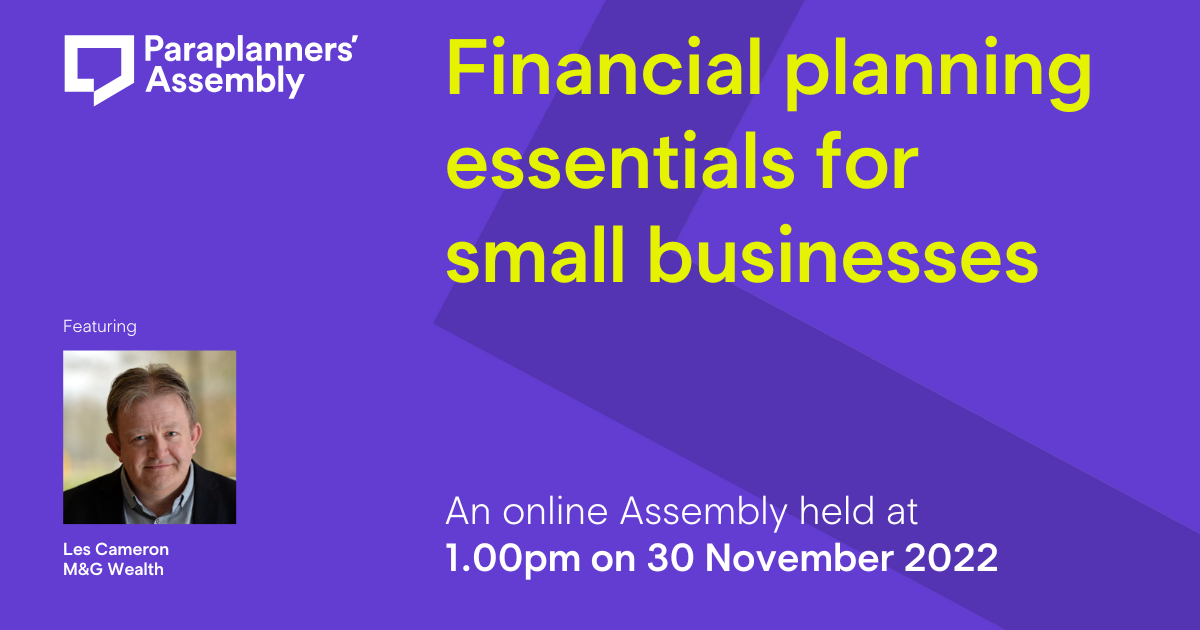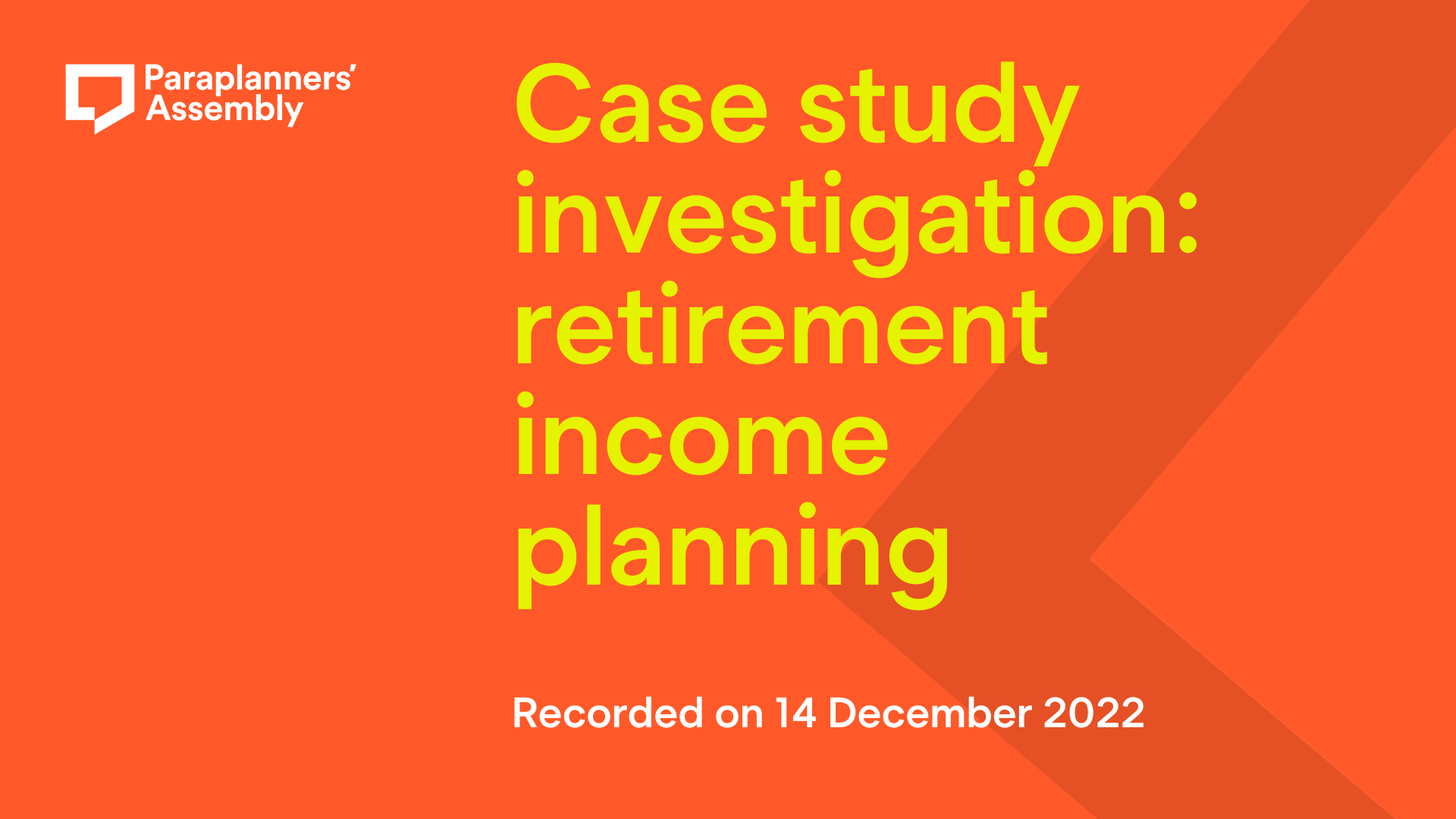
Planning for small and medium size businesses can often feature in a paraplanner’s role. But guess what? We don’t think we’d ever explored the issues that affect small businesses – and the people who run them – in an Assembly.
So we decided to fix that. And to help us navigate the topic, we were joined by Les Cameron from M&G Wealth.
Whether you already have experience in this area or are new to it we’re confident that this Assembly will be right up your street. Over the course of an hour, we expect to cover:
- how corporation tax works
- what the changes mean and how will they work
- corporate investments for surplus profits
- profit extraction and remuneration strategies
From now on, there’s no need to visit Crowdcast to save your spot at an online Assembly. Just tap ‘Book event’ and follow the step-by-step instructions.
Broken link or duff information?
If something’s not quite right on this page, please tell us what you spotted now at our bug list.
For the first time in three years paraplanners from all over the country were able to gather for real for the Paraplanners Assembly’s Big Day Out at FarmED near Chipping Norton in Oxfordshire on 15 September 2022.
Learning objectives
We opted for a blend of small group sessions – which we called Crop Rotations – and all-together sessions.
Crop rotations: Morning
For the pre-lunch sessions, we split the Assembly into three groups: Barley, Oats and Wheat.
Participants were assigned to a group and each group rotated around the three topic sessions. Conversations in each topic session were facilitated by hosts and experts. Each session lasted for 45 minutes. The topic session for rotations 1, 2 and 3 were:
What will consumer duty mean to you?
Experts: the lang cat’s Mike Barrett and Mel Holman from CATS.
The art of challenging conversations
Expert: Becca Timmins from Time to Think and Emery Little led a session on challenging conversations.
Pep up your paraplanning processes
Experts: LIFT Financial’s Jonny Stubbs and Chris Baigent-Reed from Jigsaw Tree.
After lunch, participants were assigned to a NEW group: Apples, Cherries, Pears or Plums.
That’s because we combined two groups for the session on report writing but – by the miracle of organisation – ensured each group gets a technical Q&A all to itself. So the topics for rotations 4 and 5 were:
Technical Q&A
Panellists: Les Cameron and Neil MacLeod from M&G Wealth, and Transact’s Brian Radbone and Barnett Waddingham’s James Jones-Tinsley.
Three things that get in the way of clear, compliant and client-friendly report writing
Experts: Melissa Kidd of Motem with Mel Holman from CATS.
Broken link or duff information?
If something’s not quite right on this page, please tell us what you spotted now at our bug list.

Our guests – Guy Anderson from Just, Sarah Lees from Plan Works, Ben Mastel from 7IM and Sam Tonks from Succession Wealth – discussed the case of Holly Gennero – a divorced mother of two. (Can you spot the film reference? It was the last CSI before Christmas). The team covered the following retirement income options:
- traditional invested drawdown
- annuities
- structured decumulation programmes
Plus concepts including:
- sustainable income levels
- how to measure the chance of success
- stress testing
- options for money not needed for income
Interested? Then just tap ‘Book now’ to save your spot. (And look out for the link to the retirement income case study in a couple of days before the event.)
From now on, there’s no need to visit Crowdcast to save your spot at an online Assembly. Just tap ‘Book event’ and follow the step-by-step instructions.
Broken link or duff information?
If something’s not quite right on this page, please tell us what you spotted now at our bug list.
You don’t come across SSAS very often, but when you do you need to know what you’re doing with them. We can help with that.
Learning Objectives
During the session we covered…
- Who they are suitable for?
- How they work – SSAS
- SSAS versus SIPP
- Loan back and self investment
- Planning tips
Brian Radbone of Transact and Richard Allum of The Paraplanners discuss how new regulations designed to prevent pension scams will affect advice professionals and providers dealing with pension transfers.
James Jones-Tinsley of Barnett Waddingham and Richard Allum pick their way through the potpourri of jargon associated with old pensions contract.
Many paraplanners may never have worked on an annuity or have less experience since pension freedoms came in. In this session, we cover the basics of guaranteed income.
Learning objectives
During the session we covered…
- The basics of guaranteed income
- Underwriting
- How annuities have evolved
- Comparing to drawdown
- Planning and research
- Regulation
In this brief but wide-ranging conversation, Will Mcintosh-Whyte of Rathbones talks with Richard Allum of the Paraplanners’ Assembly tackle the question of what ‘responsible investment’ is and whether it differs from ideas like ESG, or ‘ethical’ and ‘sustainable’ investing.
Learn more about the UK trust registration service requirements for UK taxable trusts and UK express trusts.
Learning objectives
During the session we covered…
- The Trust Registration Service
- Taxable trusts
- Non-taxable trusts
- How to register
- Policies issued from Ireland
A back to the basics on inflation and what it means for paraplanners.
Learning objectives
During the session we covered….
- What is inflation?
- What is it made up of?
- Why has it gone up so much, so fast?
- What do we think will happen in the future?
- How it affects assumptions and cash flow planning
